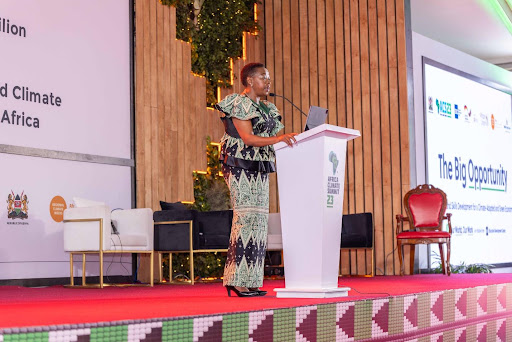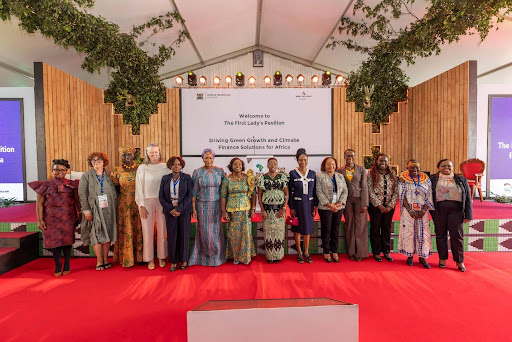|
Getting your Trinity Audio player ready...
|
By Arasha Soila
Nairobi County. As the Africa Climate Summit kicks off in Nairobi Kenya, Kenya’s First Lady Rachel Ruto has highlighted the power of education and the skills in enhancing climate action. The skills need to be developed to prepare and propel Africa’s future workforce as far as climate adaptation and green economy are concerned. The high-level session hosted first ladies from different countries, government officials, civil societies, and the private sector among other actors.
The role of education is widely accepted in the global frameworks to tackle climate change and sustainable development. Investing in education builds awareness around the climate problem and provides skills needed to prepare for the economy and the future among young people. It is also strongly connected to a person’s ability to adapt to changing circumstances and be resilient.
Education can capacitate individuals and communities to make informed decisions and take practical actions for climate-resilient sustainable development. Climate literacy is vital for producing citizens who understand the climate system and can utilize that knowledge in their engagements as active community members.

The United Nations Sustainable Development Goals 4.7 (education for sustainable development) and 13.3 (education for climate protection and climate adaptation) supports that climate change education should be embedded in national education agendas
The transition to a sustainable and climate-adaptable economy will create significant job opportunities. These economies will require green scales, new forms of leadership, and the rescaling of the impacted industries. Education can help deliver justice and equity in this transition. There is a need to have a global focus on the transformation of education systems and deliver these skills to young people.
Speaking during the forum, the first lady, Rachel Ruto, said that education undoubtedly serves as a pivotal cog in the eco-system that you can unlock the potential and opportunities of the green economy. “Through education, we will sow the seeds of awareness and comprehension.
Young people will grasp the intricate interplay between ecosystems, climate change and existing opportunities within the green economy that need to be tapped for purposes of sustainable development,” she emphasized.
In her remarks, Mama Rachel Ruto stressed the need for Africa to invest in its youth and women and equip them with the skills they need to succeed in the green economy and the transition to clean energy.
Young people in Africa should be at the forefront of these big opportunities. They need to be provided with climate adaptive knowledge and skills and get exposed to the potential and opportunities within the green economy these will enable them to be active participants and beneficiaries of the green economy and in turn contribute to the sustainable development of Africa’s future.
She reiterated by stating that empowered women are the drivers of change in communities and that by equipping them with knowledge and skills, we can amplify their impact as champions of clean energy and sustainable practices.
“If we are talking about climate change we need to focus on empowering our young youths. Our children need to be given the right information and tools including what needs to be done to have a safer home, safer environment and empower them and enlighten them on what works for Africa,” observed Sierra Leone First Lady, Fatima Maada. She also noted that it is also important to include women in these arrangements, as they need to be at the forefront when we are talking about education and skillsets. “They need to be empowered to understand climate change and the effect of climate change in our community and our children,” she added.

Dignitaries during the forum at the First Ladies Pavillion
Cabinet Secretary of Education, Ezekiel Machogu, additionally noted that teachers need to be taken through workshops and capacity-building programs on mitigating the effects of climate change and thereafter impart the same knowledge and skills to the students.
The CS also pointed out that educational materials like textbooks need to have an integration of climate change so that various topics covered can have an aspect of climate change and the information will be passed over. Schools have also been urged to upscale these practices so as to contribute to reducing greenhouse emissions.













